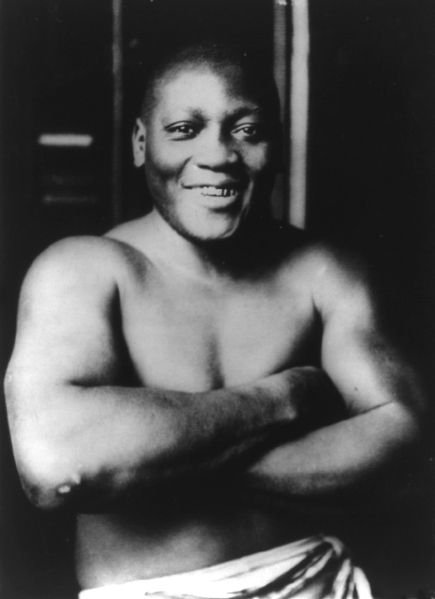Jack Johnson and The Fight of the Century
After Jack Johnson became champion, a lack of strong contenders caused public pressure to mount on James J. Jeffires, the retired former heavyweight champion, to end his retirement and fight Johnson. Jeffries was considered the first and most credible of the “White Hope” contenders.
In his prime, Jeffries probably couldn’t beat Johnson. At 35 years of age and nearly 300 pounds before he started training, Jeffries was handed an impossible challenge.
Jeffries retired in May 1905 right after his 30th birthday. In a typical response of the time, Jack London was quoted as saying, “Jim Jeffries must emerge from his alfalfa farm and remove the golden smile from Jack Johnson’s face.” Jack Johnson’s smile would remain but many in the American establishment would be frowning.
Jack Johnson was a hero to many in the African-American community. Johnson refused to bow to the racism of the day. He openly dated and married white women. He drove flashy sports cars. He had servants and rubbed his money in the face of many of his critics.
Johnson seemed to be amused by Jeffries’ challenge. Jeffries was famous for being able to fend off any boxers clinch. Johnson bragged that he would tie up Jeffries arms and pin them behind his back. Johnson was true to his word and tied up Jeffries’ arms in the fourth round.
Johnson-Jeffries occurred on July 4, 1910. Johnson mocked Jeffries throughout the fight. After hitting Jeffries, he would say, “I sincerely hope I didn’t hurt you.” Jeffries corner threw in the towel after the fifteenth round. Johnson had punished Jeffries without much resistance from the fifth round on.
The aftermath of the fight caused Johnson problems for years. Rioting occurred in some cities between whites disgusted with the outcome and backs elated with Johnson’s victory. Federal officials charged Johnson with a violation of the Mann Act for taking his future wife across state lines for immoral purposes. This case was quickly dropped but another white woman stated that she had relations with him in 1908. However, this relationship occurred before the passage of the Mann Act.
Johnson was charged with the crime anyway. Rather than submit to going to prison, Johnson fled to Europe. He would fight a few lackluster fights before defending against Jess Willard in Cuba in 1915. Johnson in his late 30s succumbed to the heat and a young challenger. He would serve one year in prison upon his return to the United States in 1920.
Johnson would continue fighting well into his 50s. He died in a car accident driving one of his sports cars on June 10, 1946. He was 68 years old. Jack Johnson was a complicated man. Legendary Fighter. Abusive Husband. Proud and Courageous Man. Flawed Human Being.
You can leave a comment or ask a question about this or any post on my Facebook page.
Pin It


